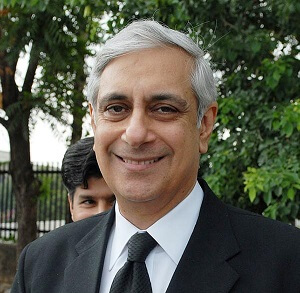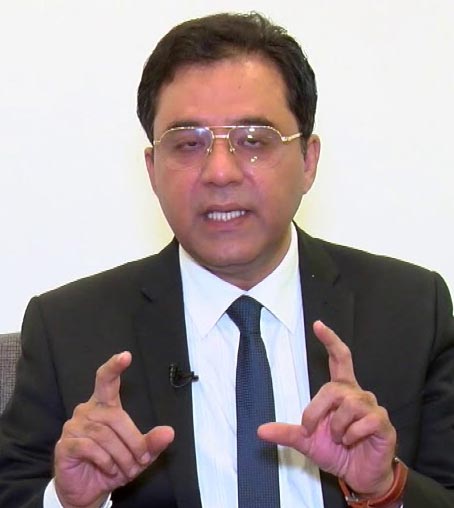In Pakistan, there has never been a dearth of scandals. The most recent one to hit headlines is the Broadsheet Scandal, which has further exposed the rot in our politics and the lack of capacity and inefficiency of our institutions, including the National Accountability Bureau. The Broadsheet saga flagged names of those, who have long remained notorious for their alleged corruption and shady wheeling and dealing. As legal and political pundits dissect the matter, legitimate questions are being asked about the fate of Pakistan’s battle against corruption.
Narratives asked former attorney general Irfan Qadir, leading Barrister Abid S. Zuberi and former deputy prosecutor general of the National Accountability Bureau, Raja Amir Abbas to share their views…

Former Attorney General of Pakistan
The first six paragraphs of the National Accountability Ordinance’s preamble are full of ambiguity. They refer to the recovery of outstanding amounts from those who have committed default in repayment to banks, financial institutions, governmental agencies, etc.; and also, the recovery of state money and other assets from those who have misappropriated or removed such assets through corruption. On the basis of these clauses, the National Accountability Bureau (NAB) approached Broadsheet LLC, an entity based in the Isle of Man, along with another company, International Asset Recovery Ltd (IAR), in June 2000 to trace the ill-gotten assets, belonging to 200 Pakistanis, stashed abroad. The NAB officials signed Asset Recovery Agreements (ARAs) with both firms.
In the first place, NAB had never needed any foreign firm’s assistance when Pakistan had its own asset recovery departments, such as the Federal Board of Revenue (FBR), Federal Investigation Agency (FIA), and so on. However, the then chairman NAB, Lt. General (R) Mohammad Amjad, was lured into employing overseas companies to recover the looted wealth.
The NAB officials inked the ARAs and were oblivious of the equivocated clauses, favouring Broadsheet and IAR. According to the terms, these firms were entitled to receive 20 percent of the “amount available to be transferred.” It is a matter of sheer humiliation that our NAB officers were too incompetent to painstakingly scrutinize the contract drafted by the firms.
Subsequently, in 2003, NAB terminated the ARAs with Broadsheet and IAR on the grounds of material (pre-contract) misrepresentation and/or fundamental breaches of the said agreements. As could be expected, the termination resulted in litigation between the parties.
The accountability bureau negotiated a settlement to avert the crisis, which was indeed highly detrimental for Pakistan. To top it off, the inept NAB officers paid the settlement money to the fake/wrong firm. In this regard, relevant documentation revealed that Broadsheet was established by a Colorado businessman, Mr. Jerry James. In 2005, the company faced liquidation proceedings in the Isle of Man, as a result of which it was dissolved and eventually revived through an injection of money by its sponsors. While Broadsheet was facing liquidation proceedings in the Isle of Man, Mr. James established a separate Colorado-based company, with the same name (Broadsheet LLC). In 2008, this Colorado-based entity, which was not a party to the original ARAs with NAB and the Islamic Republic of Pakistan, was used to negotiate an agreement with NAB, to settle all claims that the “original Broadsheet” had with Pakistan, through a one-time payment of $1.5 million.
Needless to say, this payment of $1.5 million, paid to the “wrong” Broadsheet, did not settle the actual dispute. It resulted in arbitration proceedings between Broadsheet LLC (based in the Isle of Man) and Pakistan.
In this matter, while we question the bureau’s incompetence, one can also doubt whether the NAB officers were intentionally colluding with the “wrong” Broadsheet.
This Broadsheet saga is, in fact, a test case for the entire state of Pakistan, which pertains to the government as well as the opposition, and all other stakeholders. While everyone should stand united to fight this case internationally, the ongoing blame game and political point-scoring between the government and the opposition are severely sabotaging the national interest.

Barrister at Law & Advocate Supreme Court
How is the Broadsheet case impacting the already tense political situation in the country? Will the government learn from the mistakes made by its predecessors and carry out much-needed reforms in the accountability process in Pakistan? These are the most sought after questions since the Broadsheet case came to light.
The case pertains to the non-payment of service fees to the asset recovery company Broadsheet LLC by the Government of Pakistan and the National Accountability Bureau (NAB). This saga has exposed the negligence and incompetence at the highest levels of the government and NAB. It did not only tarnish its reputation but also incurred massive financial losses to the country. Will the culprits be brought to account for those losses? This is the real test for the government.
On July 20, 2000, the NAB hired two asset recovery companies, namely Broadsheet LLC, registered in the Isle of Man, and the UK-based company, International Asset Recovery (IAR), to investigate the illegally accumulated wealth of Pakistani politicians, including Nawaz Sharif and his family. However, the investigations were dropped when then President General (R) Pervez Musharraf allowed Nawaz Sharif and his family to leave the country. And in 2003, the NAB cancelled the agreement with Broadsheet.
Broadsheet filed a case for arbitration with respect to the claim of their service fee and damages. In 2008, NAB entered into a settlement agreement with the wrong Broadsheet and paid $1.5 million, despite knowing about the liquidation of the actual Broadsheet LLC. The whole situation was a comedy of errors and displayed gross negligence on the part of NAB and the government.
Their repudiation of the agreement with firms; the settlement with the wrong company; and pursuing the cases in a bungling manner not only caused financial loss to the country but dented its reputation as well. Such gross and criminal negligence should not be overlooked.
The government has taken a bold step by appointing a commission to inquire into the Broadsheet debacle and other related matters. A retired, learned judge of the Supreme Court, Justice Azmat Saeed, has been nominated as the commission’s chairman. The opposition has rejected this commission, alleging it to be biased. Nevertheless, the accusation and counter accusations cannot deflect from the truth about the responsibility of persons who have brought this shame to Pakistan and failed to recover the looted wealth.
The claim of exoneration by the opposition leaders was flatly rejected by Kaveh Moussavi, CEO of Broadsheet. He has also accused NAB of sabotaging his efforts to unearth the looted wealth of Pakistan, as well as removing the names of people from the list given to him for the probe. Moussavi has described NAB as a conspiracy against the people of Pakistan.
Thus far, it can be established that there has been an abject failure on the part of Pakistan and NAB to pursue the matter of looted wealth. Now, the test for the government is to ensure the recovery of the looted wealth. For this purpose, the first step is to revamp the whole accountability process, including NAB.
Regrettably, NAB has failed the people of Pakistan because the references it files against politicians accused of corruption eventually assists in their acquittal from courts, given faulty investigations or lack of evidence. The accountability process cannot be successful under the existing setup of the NAB. As long as it continues, a valid accountability process and recovery of looted wealth, will remain a dream for the people of Pakistan.

Former Deputy Prosecutor General NAB
Ignorance of the law is no excuse, a dictum internationally recognised. Viewed against the touchstone of this phrase, the verdict given by Sir Anthony Evans, the sole arbitrator in the case titled Broadsheet LLC versus the Islamic Republic of Pakistan and the National Accountability Bureau (NAB), reveals the pathetic and miserably low standards of legal acumen and knowledge depicted by then Chairman NAB, Prosecutor General NAB and private Pakistani lawyers hired by NAB to settle the matter. The entire matter has three phases:
1. Drafting, Understanding, and Preparation of the Basic Agreement between the parties:
Even a layman or fresh law graduate would not subscribe or pledge to many clauses incorporated in the Agreement as they were perhaps intentionally left ambiguous and vague, particularly clause four, which explains and creates a right of recovery and claim of Broadsheet LLC regarding looted and plundered assets, traced and recovered, pertaining to the registered names of more than 100 public office holders of Pakistan, provided by NAB.
Failing to understand that the original Broadsheet firm was substituted by Broadsheet LLC, a shell company incorporated in the Isle of Man, a British Island, without having the requisite experience, funds, and infrastructure required to carry out tracing and investigation of looted and plundered assets abroad.
2. Gross Criminal Negligence in Out of Court Settlement:
In 2008, when the NAB approached Broadsheet LLC for an out of court settlement, it was under liquidation, and was dissolved by the High Court. The person with whom NAB entered into the settlement by paying a heavy amount of $1.5 million, was not carrying any Valid Assignment Deed. Moreover, the liquidator appointed by the Court on behalf of Broadsheet LLC, was not alien to the entire settlement proceedings. This criminal negligence on behalf of NAB and the Pakistani lawyers, appointed to settle and negotiate the matter resulted in a huge loss to the Pakistani exchequer. The scenario reminds one of the iconic English movie, Gone with the Wind.
3. Main Proceedings before the Sole Arbitrator, Sir Anthony Evans:
The Pakistani Legal team failed miserably in filing proper pleadings, evidence, and framing of actual issues of controversy before the arbitrator. And the legal proceedings were conducted in a manner that depicted poor quality of preparation, understanding, presentation, and application of relevant laws and judgments. This abject performance resulted in a huge penalty against Pakistan and in favour of Broadsheet LLC. There are still chances that fresh litigation may result in case of recoveries from the Sharif and Zardari families and many more incorporated in the list of assigned and registered targets and entities annexed with the schedule of the original agreement, as again the agreement is silent about any time frames. The wretched Broadsheet saga portrays a series of international legal battles fought by Pakistan’s legal teams against heavy sums paid in the shape of legal consultancy charges that have brought nothing but failure, disappointment, and catastrophic results in legal cases before various international legal forums. There is a big question mark on the authorities who appoint and engage such law firms for reasons and considerations best known to them, resultantly, causing huge monetary losses to the government exchequer whether it is the Reko Dik Copper case or Karkay Dispute case, or the Broadsheet claim.



